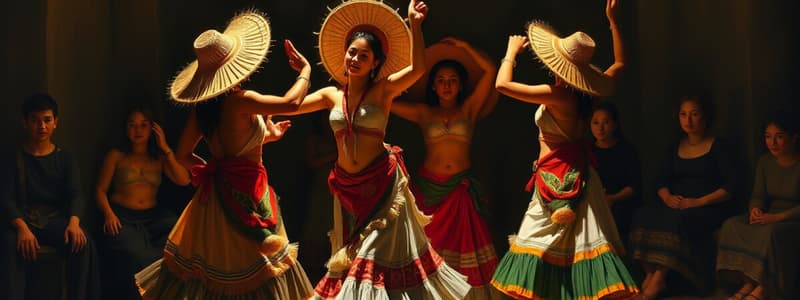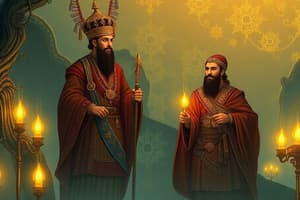Podcast
Questions and Answers
What does Cordillera dance refer to?
What does Cordillera dance refer to?
Traditional dances from the Cordillera region in the Philippines.
Which of the following is NOT a key characteristic of Cordillera dance?
Which of the following is NOT a key characteristic of Cordillera dance?
- Cultural Significance
- Distinctive Movements
- Costumes and Attire
- Modern Instruments (correct)
Cordillera dances are used for ceremonies and celebrations.
Cordillera dances are used for ceremonies and celebrations.
True (A)
What traditional instruments accompany Cordillera dances?
What traditional instruments accompany Cordillera dances?
What does the Banga dance illustrate?
What does the Banga dance illustrate?
What is the main theme of the Bendayan dance?
What is the main theme of the Bendayan dance?
What occasion prompts the performance of the Lumagen/Tachok dance?
What occasion prompts the performance of the Lumagen/Tachok dance?
What does the Manmanok dance mimic?
What does the Manmanok dance mimic?
What does Salisid symbolize?
What does Salisid symbolize?
What type of dance is Turayen?
What type of dance is Turayen?
What type of dance is Uyaoy?
What type of dance is Uyaoy?
Flashcards are hidden until you start studying
Study Notes
Cordillera Dance Overview
- Traditional dances from the Cordillera region of the Philippines, known for its rich cultural heritage.
- Deeply rooted in indigenous cultures, reflecting daily lives, rituals, and community beliefs.
Key Characteristics
- Cultural Significance: Essential for ceremonies and celebrations, such as agricultural rites and community gatherings.
- Costumes and Attire: Performers wear traditional clothing made from woven fabrics and intricate beadwork, representing cultural identity.
- Traditional Music and Instruments: Accompanied by instruments like gongs, drums, and bamboo flutes, enhancing the performance's cultural aspects.
- Distinctive Movements: Energetic and rhythmic, often mimicking animal behaviors or agricultural activities.
Notable Dances in Cordillera Tradition
- Banga: Contemporary Kalinga dance featuring maidens balancing heavy pots on their heads, showcasing strength and grace.
- Bendayan: A circle dance from Benguet, historically celebrating headhunters' success, now integral to local festivities.
- Lumagen/Tachok: Performed during happy occasions by Kalinga maidens, imitating flying birds, accompanied by gongs.
- Manmanok: Mimics the behavior of fowls, performed by warriors using colorful tribal blankets to attract a maiden’s attention.
- Salisid: A courtship dance representing a rooster courting a hen, involving male and female dancers with cloth pieces.
- Turayen: An occupational dance from the Gaddang Tribe, depicting swidden agriculture and resembling birds attracted to tobacco trees.
- Uyaoy: An Ifugao wedding festival dance performed by affluent individuals, accompanied by gongs, holding cultural significance even in death.
Studying That Suits You
Use AI to generate personalized quizzes and flashcards to suit your learning preferences.



